|
|
| Building THE ELLIE | LOBBY | MAIN HALL | OTHER SPACES | OPENING NIGHT | The STARS | MOVERS & SHAKERS | CARMEN |
| DENYCE GRAVES, mezzo-soprano: on The Ellie, Opera Colorado, and Carmen | Carmen at THE ELLIE STARS who celebrated THE ELLIE DENYCE GRAVES in FanFaire: On CARMEN On DALILA & other roles Samson et Dalila at LA Opera DISCOGRAPHY
|
||||||||||||||
|
If the City of Denver opened The
Ellie with a big bang, Opera Colorado opened its first season in its
new home with the kind of fireworks only an opera like CARMEN
and a star like DENYCE GRAVES could ignite.
"I love being here in Denver. I've enjoyed my stay. And the theater is beautiful!" Denyce Graves was obviously having a great time. So was her baby daughter Ella, one and a half years of age, whose playful baby talk could be heard in the background as we began our phone interview with one of today's most sought after mezzo-sopranos. "Opera singer in training," Denyce declared jokingly, laughing as Ella (named for Ella Fitzgerald, an icon of American music) bawled an earful of her own mezzo-soprano. Doting mother and child were being driven around town in between performances of Carmen at The Ellie. Denyce sounded quite at home
in Denver, and at The Ellie as she spoke in almost endless superlatives
of the star dressing room: "I love the
dressing room! It's large and spacious and I therefore can have my
daughter with me. She can run around and have the nanny there with
her as well. We all have enough space. I love it, I love having the
luxury. AND my dressing room has a Bösendorfer! Which is quite
unusual and very... hmm... extravagant! It's a great place,
and the staff is very kind." She
found the theater itself to be acoustically dry onstage, however,
and challenging to sing in; but she's quite understanding.
"I know that sometimes when they're working on these theaters,
those things take time." The sound
experts, taking heed, have made minor acoustical adjustments so that
the sound onstage is now noticeably brighter, hopefully to everyone's
satisfaction. "I CAN'T SAY ENOUGH ABOUT PETER..." It was not her first time in the "Mile High City". "I was in Denver two and a half years ago for a Gala Concert, and at that time Peter Russell told me that they were building a new theater and asked if I would come and sing." There lies the deeper reason for her special feeling about Denver. "I can't say enough about Peter. He's been such a good friend to me professionally and personally. He really looked after me at a very dark period in my life. He took care of me and continued to recommend me for different engagements. It has been such a beautiful working relationship, one that I have enjoyed and am proud of. It goes back to 1989, 1990 maybe." She was referring of course to Peter Russell, President and General Director of Opera Colorado, and reflecting back on the years when Peter, as General Director of Wolftrap Opera Company and co-founder of Washington Concert Opera, was an active figure in music circles in the Washington, DC area which Denyce has always called home. She had also worked with Stephen Lord, who was conducting her in this production of Carmen. "We did Offenbach's La Périchole together. The opera really is so much fun. Stephen knew the piece very, very well. He's had a long experience with it and he really gave me a lot of helpful advice. We had a grand time with that. It was very different - a lot of singing, a lot of dancing, a lot of clowning around, a lot of foolery, and nobody died at the end. We just enjoyed ourselves and had a really great time. And since then, Stephen and I have been looking for something to do together." How wonderful that Opera Colorado could bring them together again, under the most auspicious circumstances. back
to TOP
Opera Colorado's Artistic Director, James Robinson directed. By his own account, he had a great time working with her. "I did too. It was my first time to work with Jim," she said, sounding quite pleased. "I find his work very powerful and what I love the most about it is that it's uncontrived. So often, in all of her scenes, Carmen is really contrived. I think she is very natural in the way that Jim presents her. And I like that." Robinson, who stands at the forefront of today's generation of stage directors, is known for bringing a new point of view to his productions. This Carmen is no exception. In fact, it has invited some controversy because he shifted the focus of the story away from Carmen to the anti-hero Don José - which, as far as we know, had never been done before. There are not very many title roles for the mezzo-soprano in the repertoire, and Carmen is considered the plum - indeed the most successful - of all mezzo roles. So, would a mezzo-soprano, especially THE mezzo who is thought to own the role today, feel upset by this not-too-slight shift in focus? There was understandably a hint of it in Denyce's answer. "Yes, the focus is sort of on Don José in this production. You know I've done lots of miscellaneous versions of Carmen. I love this whole concept of the burnt-out theater, it's new for me. It's interesting, and I think it's brilliant. It's fresh, so it brings something new to my whole frame of reference, and I'm grateful for that. But, you know, I personally think, looking at it from the side of urbanity, that tenors get enough glory and mezzo-sopranos don't get very much. So I think from that standpoint, since the name of the opera is Carmen, leave it for Carmen. But I think Jim did a beautiful job from the perspective of Don José, I really do."
Most mezzo-sopranos begin their career getting the voice primed to sing the ultimate mezzo role, sooner or later in their careers. What is unusual about Denyce Graves and Carmen is she gained ownership of the role literally at the beginning of her career. "Were you always drawn to Carmen?" we asked, expecting to hear an answer firmly in the affirmative. But "No, I was never drawn to the role of Carmen. Not at all. It was just a role that was offered to me quite early in my career because of my voice type, among many other different things. People thought I looked like her and acted like I had the temperament of Carmen, that I had the right color of voice.... And you know, it takes a particular mezzo voice, one that has a real colorful middle - so much of it is written in the mid range. But no, it was not something that I set out to do early on." Yet it quickly became her signature role. Bizet could not have imagined a more suitable Carmen. "Did you sense early on that it would be your first calling card?" we asked Denyce, as we got deeper into a discussion of this most fiery of operatic roles. "You know, I never thought of it in that way. Not at all. When I did it the very first time, I was really in love with the character and particularly in love with the production." We assumed, wrongly, that it was the Met's production, as it is the one most written about. "Oh, in many places before the Met. My very first one was with Minnesota Opera in 1991, probably one of the most beautiful ones for me. We had a huge success with it. Already at that point, it felt like it fit the voice for sure. But, you know, even before singing it - right after reading the story by Mérimée - it felt like I really understood who this woman was. And I felt that I made a connection with her. "
We wondered if her current Carmen is very different from her earlier Carmen. "Oh, my gosh! It is, and it has grown as I have. Now I'm trying to show much more of her inner thoughts. The real challenge is in the fact that, you know, you never see Carmen alone - there's NEVER a moment in the opera where she's alone. She's never alone like Micaela, where you get a real look at who this woman is and what her thoughts are. "It is frustrating because you never get a chance to let loose. And you never get the beautiful music - I mean, the beautiful music goes to Don José and Micaela. All of her arias are with everybody - the 'Habanera' with a chorus, the 'Seguidilla' is with him, the song with the girls, the trio with the girls. You know, she doesn't even get an aria!" Which, if one thinks about it is kind of unusual for the title role of any opera. "She doesn't," Denyce repeated emphatically, venting her frustration. "And so from that point, it is frustrating, but at the same time it's a challenge." It gets more interesting. "Would you tell us about Carmen - when you interpret the role, what kind of person do you see, who is Carmen?" "Well, I would say if I had one word to describe her, it's freedom. That's the thing she's in search of, what she wants more than anything. I think she's extremely natural and that's what I like about what Jim Robinson has done. So often when she sings the 'Habanera', she comes out and makes it into a real show tune sort of thing, and I don't think it's that way at all. I see it as something which is very personal, with a lot more depth than that. "There's so much to say about Carmen... One of the greatest misconceptions about Carmen in my opinion is that she's somehow some sort of woman available to men and I don't think that's the case at all. No, she's not a flirt. The reason that she is so desirable is because she is unattainable. I think she's playful and I think she can, certainly if she chooses to, use her charm to get whatever it is she wants. I think she's very smart, and she knows other people's weaknesses. I think she can see that and she can smell it." "Is she basically a happy person?" "Oh, isn't that a good question! That's a very good question. Hmmm... no, I don't think she's happy." "And that's why she keeps on searching?" "Yes, I think she's always searching. I think she's bored, and she's crafty. Basically the people that she's surrounded with are not as smart as she is. This is boring for her, and this is what contributes to her unhappiness, in my opinion. I think also that she wants to entertain herself and excite herself. All of her arias begin the same way - they start very quietly, and it erupts into something. That speaks a lot of what she is. She's always coming from nothing, and she has to be the one to sort of get the energy going and stir up things. She's sort of the fire starter, always taking responsibility for her own momentary happiness and the happiness of others. "She doesn't have anyone who challenges her or interests her. That is why Don José is so appealing, because he is so completely sincere in his naive way. I also think that the passion that he expresses toward her is terribly exciting and interesting, because he's completely sincere and her life style is not one where she's dealing with sincere people.
"I think that she found some sort of fire in him, she found him interesting. But then he became very convenient later. There was something about him, as she says, for the moment: 'Pour le moment, je suis ameureuse!' I'm not interested, for the moment, she tells him. She has Don José in her mind and in her heart, thus it was impossible for her - at the moment. But later I think, as her relationship with Don José starts to sour, Escamillo becomes very convenient. He shows up again, but she doesn't expect that. And then- Oh! He's going to be a good diversion and a nice transition out of this one relationship with Don José." "But did she love him at one time - Don José?" "Yes! She absolutely did, in her own way. She has many low points with Don José. Even in that tune which is one of the happier moments - you know, when she delivers him this very special gift of dancing and singing for him alone - I don't think that that's an offering that she gives many people at all. The fact that he rejects her and says to her that he's going back to the barracks is a great insult to her. But at the same time, what makes Don José so interesting is that no one else would have done that. And she knows that just like herself, he's so sincere about what he believes. "The problem is that they're polar opposites. In the score when he says: 'Come with me, let me take you away to this place which is going to be great. I've forgotten all about our past, it doesn't even exist anymore for me,' I think he really believes that. When she says to him in Act 2 - and they're both dreamers in a way, you know - 'La bas, la bas dans la montagne... - there, we could be in the mountains, it's going to be great. If you really loved me you wouldn't be telling me this, singing about the flower that kept its perfume for you in prison. What you would really do, if you loved me, is come away with me.' I think she really believes that too. And for her, that is the ultimate - we'll live under the sky, we'll be free to do what we want to do, and we won't listen to anybody. When they play the bugles, to tell us that it's time to go back to the barracks, we'll do what we want to do. But he can never even conceive of that. They're so completely opposite - which is why they find each other so attractive. To Don José, she's a wild animal." "So in the end, does she feel trapped?" "No, I don't think so. They're both extremely passionate people, no question about that. But I think she realizes in the end that they're two different types of animals that don't exist in the same world. In the dialogue she says 'Chiens et loups... Dogs and wolves don't belong together.' So basically, she just feels that they're sooo different, that there's no way they can understand each other, that he doesn't belong in her world." "Does she at some point have an inkling that she is going to die?" "She does, many times. She believes very strongly in the cards, and they tell her right away that her end is going to be with him. She believes this: she says, 'The cards never lie. They always tell the truth.' And when she meets him the night before, she says 'I know this is the moment that you're going to kill me. And I know that this is it.' But I still think that she has a glimmer of hope that maybe he doesn't have the courage to do it. Maybe, this one time is going to be the exception." "There's not a hint of it in the opera, but does she ever search for a higher being too?"
"So, do you always go back to the original source of the opera, in this case Mérimée's novel? Is that how you always prepare for a role?" "With this piece I did. But one has to be careful, because it's a different work. I mean, the opera is a separate work from the novel. You can certainly gather a great amount of information to form your whole frame of reference and I do think that the more informed you are, the more detailed you'll be in fleshing out the character. Even though the opera doesn't go into all that detail, you have that in your pocket - in your repertoire - and I do think as I read, that that gets communicated, whether people are able to articulate it or not. I think that somewhere they see that there's a lot of thought that's gone into creating this character." Indeed. Is it any wonder then that Denyce Graves owns the role and, with a voice rich and darkly burnished like no other, communicates Carmen's fire and innermost thoughts like no other? P.S. There's more to this
interview as Denyce kindly also shared her thoughts on some of her
other roles. CLICK
HERE for more.
back to TOP Portraits of Denyce Graves - Source: www.denycegraves.com
|
|||||||||||||||
Design and Original Content: FanFaire LLC © 1997-2006. All rights reserved. |
|||||||||||||||
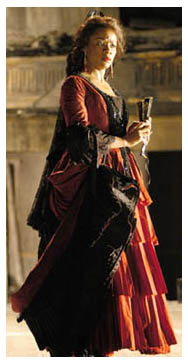
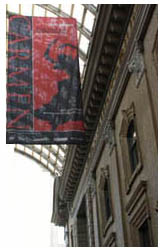
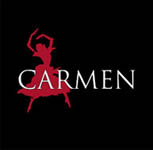
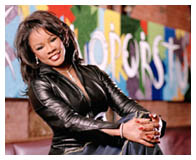 "So
you started preparing for it right away? How long did it take you
to learn the role?" curious about how she developed the character.
"So
you started preparing for it right away? How long did it take you
to learn the role?" curious about how she developed the character.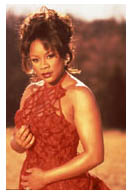 "And
so, was she just flirting with Escamillo?"
"And
so, was she just flirting with Escamillo?"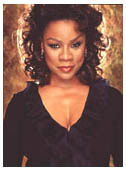 "Hmmm...
no. She is very superstitious, that we do know. Extremely superstitious.
In the novel we know that on the day she meets Don José, she
knows that he is going to kill her because earlier that day a priest
came to her door and also a rabbit went through the legs of her horse
- signs that something very, very serious is going to happen. I don't
see that there's a search for a higher being. She's more of a fatalist.
She believes that whatever's going to happen will happen, and she
doesn't fight it. I don't see her as searching for higher meaning.
She's a woman who lives in the present. What's exciting about
her is that she is living for right now. So, she's very existential
in that sense. And that's very attractive."
"Hmmm...
no. She is very superstitious, that we do know. Extremely superstitious.
In the novel we know that on the day she meets Don José, she
knows that he is going to kill her because earlier that day a priest
came to her door and also a rabbit went through the legs of her horse
- signs that something very, very serious is going to happen. I don't
see that there's a search for a higher being. She's more of a fatalist.
She believes that whatever's going to happen will happen, and she
doesn't fight it. I don't see her as searching for higher meaning.
She's a woman who lives in the present. What's exciting about
her is that she is living for right now. So, she's very existential
in that sense. And that's very attractive."